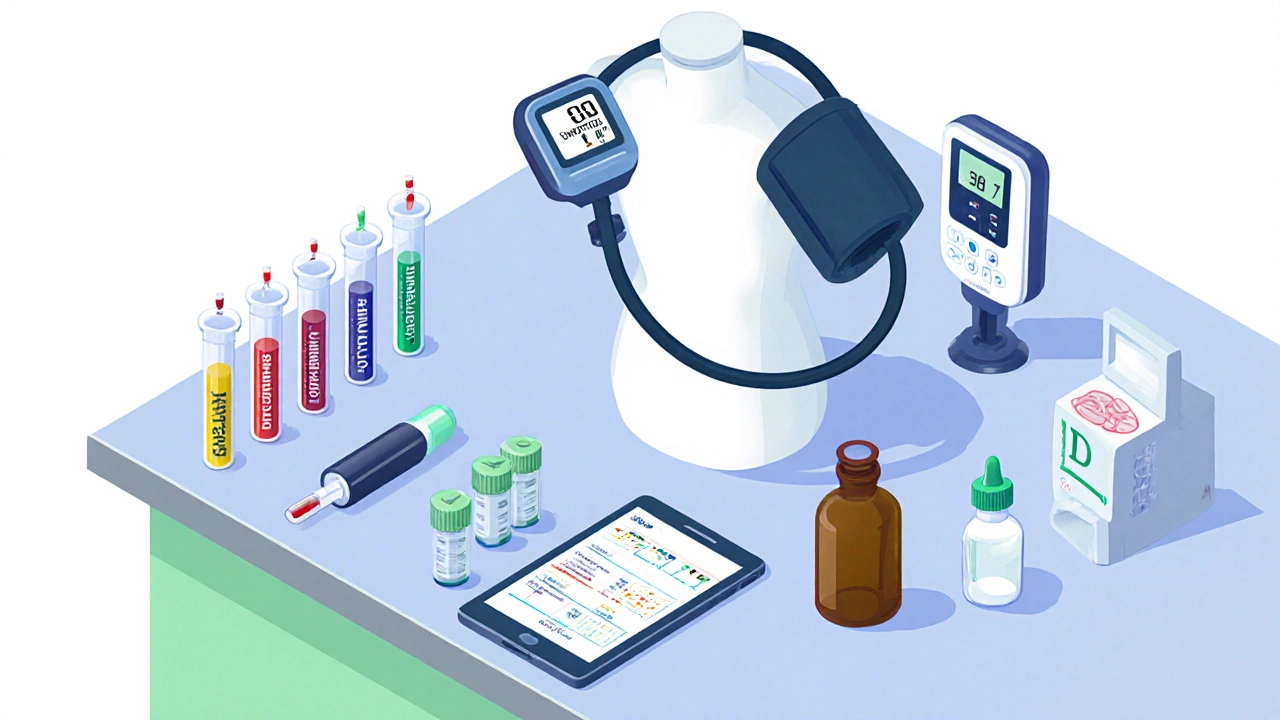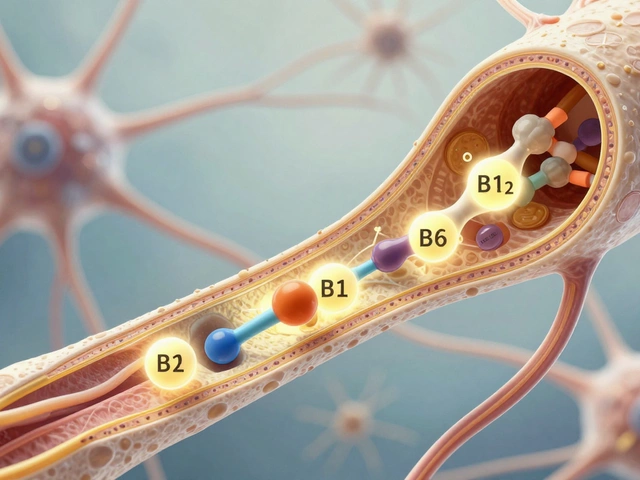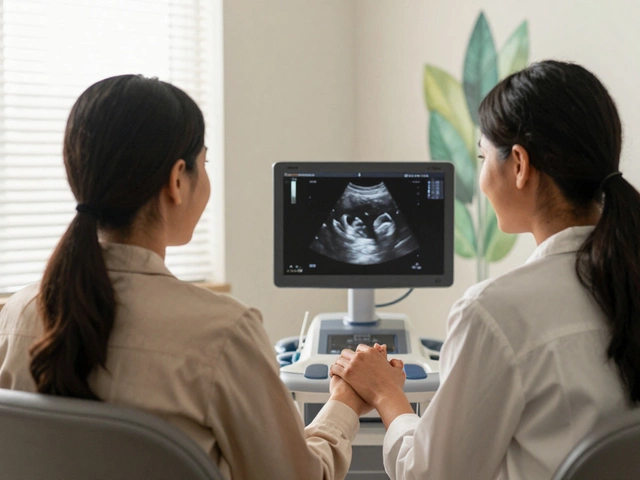Health Risk Assessment Calculator
Your Cardiovascular Health Risk Assessment
Enter your health metrics to estimate your cardiovascular risk level. This tool provides a general estimate based on common health factors.
Enter your information above to see your cardiovascular risk assessment.
When you hear the phrase best health test, you probably picture a one‑stop lab visit that tells you everything about your body. In reality, the right answer is a Comprehensive Health Screening - a curated set of investigations that together paint a clear picture of your current health status and flag hidden risks before they become serious problems.
Why a Comprehensive Health Screening Matters
Skipping routine checkups is easy when you feel fine, but many conditions - high blood pressure, early‑stage diabetes, cholesterol imbalances - develop silently. A well‑designed screening catches these silent threats early, giving you a chance to act with lifestyle tweaks or early treatment.
Key benefits include:
- Early detection of chronic diseases that are easier and cheaper to manage when caught early.
- Baseline data that helps track the impact of diet, exercise, and stress‑reduction over time.
- Peace of mind - a clear report lets you focus on goals rather than worrying about the unknown.
Core Components of the Best Overall Health Test
Every reputable package should cover a handful of essential markers. Below is a practical checklist, each explained in plain language.
-
Blood Pressure Measurement - A simple cuff reading that indicates how hard your heart is working. Consistently high numbers (≥130/80 mm Hg) raise the risk of heart disease and stroke.
-
Lipid Profile - Includes total cholesterol, LDL, HDL, and triglycerides. Elevated LDL (>130 mg/dL) or low HDL (<40 mg/dL for men, <50 mg/dL for women) signal a need for dietary changes or medication.
-
Fasting Blood Glucose Test - Measures sugar after an overnight fast. Values between 100‑125 mg/dL indicate pre‑diabetes, while ≥126 mg/dL points to diabetes.
-
Liver Function Test - Checks enzymes (AST, ALT, ALP) and bilirubin to assess liver health. Abnormal levels can hint at fatty liver disease, alcohol impact, or medication side‑effects.
-
Kidney Function Test - Includes serum creatinine and estimated glomerular filtration rate (eGFR). A reduced eGFR (<60 mL/min/1.73 m²) signals early kidney dysfunction.
-
Cancer Screening Panel - Depending on age and gender, this may cover Pap smear, HPV DNA test, mammography, PSA, or colorectal stool‑based tests. Early detection saves lives.
-
Cardiovascular Risk Assessment - Combines age, gender, blood pressure, lipid values, and smoking status into a risk score (e.g., QRISK or ACC/AHA calculator). The score guides preventive medication decisions.
-
Vitamin D Test - Measures 25‑hydroxy vitamin D levels. Deficiency (<20 ng/mL) is linked to bone loss, fatigue, and immune issues.
These eight tests form the backbone of any truly comprehensive evaluation. Some premium packages add thyroid panels, inflammatory markers (CRP), and bone density scans, but the list above covers the major health domains for most adults.
How to Choose the Right Package for You
Health checkup providers often bundle tests into “Basic,” “Standard,” or “Premium” packages. Picking the best fit involves balancing three factors:
- Age and gender. Women under 40 typically need Pap smears and bone health checks, while men over 50 benefit from prostate screening.
- Family and personal risk history. A family history of heart disease or diabetes warrants a more aggressive lipid and glucose work‑up.
- Budget and convenience. Some labs charge per test, others offer flat‑rate bundles. Look for transparent pricing and the option to add on extra tests later.
Ask the clinic for a detailed test list and verify that it includes the core eight items listed above. If a package omits anything critical for your risk profile, either upgrade or request a custom add‑on.

Package Comparison: What You Get for Your Money
| Package | Tests Included | Approx. Cost (₹) | Best For |
|---|---|---|---|
| Basic | Blood Pressure, Lipid Profile, Fasting Glucose, CBC | 2,500 | Young adults (20‑35) with low risk |
| Standard | All Basic tests + Liver Function, Kidney Function, Vitamin D, Cardiovascular Risk Score | 5,500 | Mid‑life (35‑50) individuals or those with family risk |
| Premium | Standard tests + Cancer Screening Panel (gender‑specific), Thyroid Panel, CRP, Bone Density (DXA) | 12,000 | Adults over 50, those with multiple risk factors, or anyone wanting a thorough preventive check |
Remember that prices vary by city and lab reputation. In Bangalore, top‑tier hospitals may charge a premium but often include specialist consultation in the bundle.
What to Expect on the Day of the Screening
Most centers ask you to fast for 8‑10 hours before blood draws - water is fine, but avoid coffee, tea, and sugary drinks. Bring a list of current medications, as some drugs (e.g., statins) affect lipid results.
The visit usually follows this flow:
- Registration and brief health questionnaire.
- Vital signs check (blood pressure, height, weight, BMI).
- Blood draw - a phlebotomist will collect 5‑10 ml of blood.
- Specialized samples (e.g., urine for kidney function or stool for colorectal screening) if included.
- Imaging (mammogram, ultrasound, or DXA) scheduled on the same day or within a week.
- Post‑test counseling - a doctor reviews results and suggests next steps.
Turnaround time for most blood work is 24‑48 hours. Imaging reports may take a few days.

Interpreting Your Results and Next Steps
When the report arrives, focus on three sections:
- Normal range vs. your value. Labs provide reference intervals; deviations signal areas needing attention.
- Risk categorization. For example, a cardiovascular risk score of 15% places you in the ‘moderate‑risk’ zone, prompting lifestyle changes.
- Actionable recommendations. The clinician may advise repeat testing, medication, diet tweaks, or specialist referral.
Don’t panic over a single abnormal number. Trends over time matter more than a one‑off reading. Schedule a follow‑up in 3‑6 months to see if interventions are working.
Frequently Asked Questions
How often should I get a comprehensive health screening?
For most adults, a full screening every 2‑3 years is sufficient. Increase frequency to annually if you have chronic conditions, a strong family history, or lifestyle risk factors like smoking.
Is fasting really necessary?
Yes, fasting stabilizes glucose and lipid levels, giving a true baseline. Skipping the fast can falsely elevate triglycerides and blood sugar, leading to misinterpretation.
Can I do a home health checkup instead of visiting a lab?
Home kits are handy for single tests like blood pressure or glucose, but they lack the accuracy and comprehensive panel of a professional lab. For a true best health test, a certified facility is still the gold standard.
What if I’m already on medication? Will it affect the results?
Certain drugs can skew test values - for example, statins lower LDL, and diuretics can raise blood urea nitrogen. Always inform the physician; they may ask you to pause some meds for a short window if safe.
Are these screenings covered by insurance in India?
Many corporate health policies cover basic panels. Premium packages often require out‑of‑pocket payment, but you can request itemized billing and submit for reimbursement where applicable.
Take Action Today
Start by noting down your age, any family‑history red flags, and your budget. Then call a reputable diagnostic center in Bangalore, ask for a detailed breakdown of tests, and schedule the appointment. Remember, the earlier you catch a hidden issue, the easier it is to manage.
Health is the only wealth you can’t earn back once it’s gone. A well‑chosen screening is a small investment that can save you years of wellbeing and countless medical bills.







